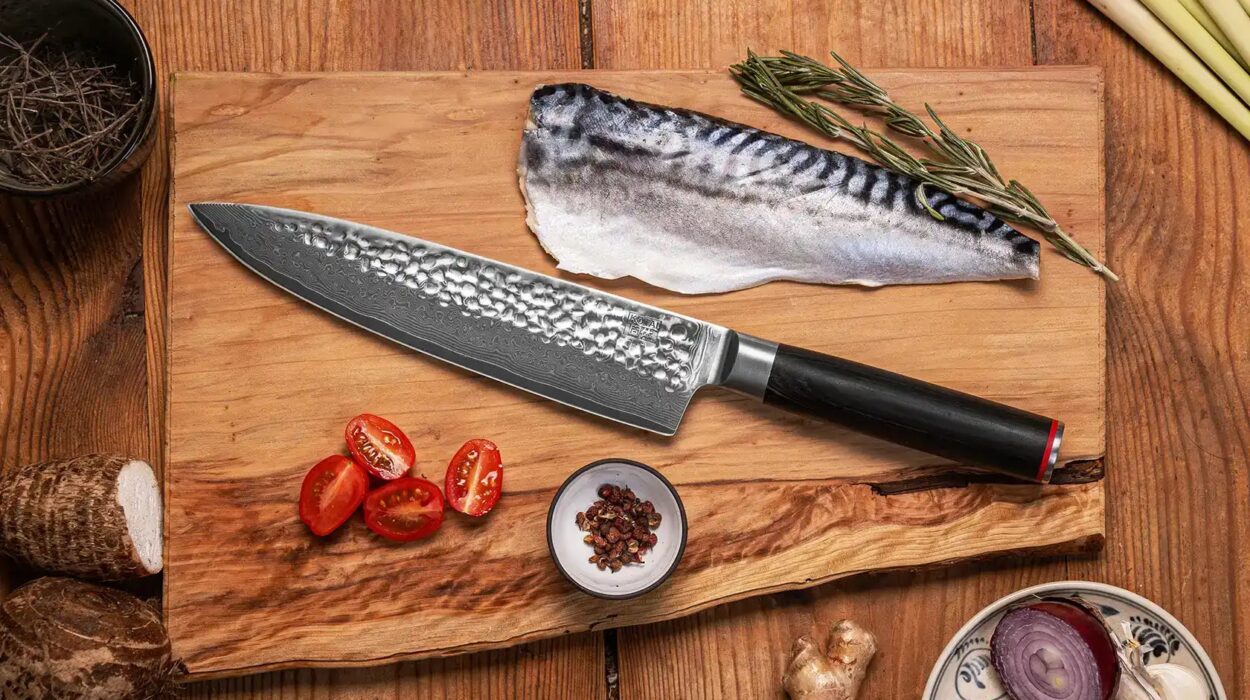As a kitchen professional, owning a Damascus knife can significantly enhance your culinary experience. These knives are renowned for their sharpness and beautiful design. However, proper damascus knife maintenance is crucial to ensure longevity and performance.
Our guide on maintaining your Damascus knife will cover essential tips and tricks that will keep your knife in pristine condition. Whether you’re slicing and dicing in a commercial kitchen or preparing meals at home, understanding how to care for this valuable tool is essential.

What Makes Damascus Knives Unique?
Damascus knives are prized for their distinctive wavy patterns and superior cutting ability. They are made from a combination of different steels folded together, resulting in durability and an edge that stays sharp longer. This blend of beauty and functionality makes them a favorite among chefs.
Importance of Damascus Knife Maintenance
Regular maintenance of your Damascus knife not only preserves its elegance but also its effectiveness in the kitchen. Without proper care, these knives can lose their sharp edge, and their distinctive patterns can fade.
Basic Maintenance Tips
- Washing: Always hand wash your Damascus knife with mild detergent and warm water. Avoid dishwashers as they can damage the blade.
- Drying: Dry your knife immediately after washing to prevent any rust or staining.
- Storage: Store your Damascus knife in a knife block or magnetic strip to avoid dulling the blade.
Sharpening Your Damascus Knife
Maintaining a sharp edge is crucial for any knife, and Damascus knives are no exception. Using a whetstone is the best method for sharpening. Start with a coarse grit and work up to a fine grit to preserve the blade.
Handling Rust and Staining
Despite their resilience, Damascus knives can still rust if exposed to moisture for extended periods. If rust appears, gently remove it with a non-abrasive material like baking soda and water.
Advanced Maintenance Techniques
Keen on learning more about the cultural significance and history of Damascus knives? The history of Damascus knives offers valuable insights into their enduring appeal.
- Oiling: Regularly oiling the blade with food-grade mineral oil will keep the steel conditioned and prevent rust.
- Professional Sharpening: Occasionally, consider professional sharpening services to maintain the integrity of your knife’s edge.
- Avoiding Hard Surfaces: Always use a wooden or plastic cutting board to keep the edge from dulling.
Mistakes to Avoid
- Using Abrasive Cleaners: They can scratch the surface and mar the beautiful patterns.
- Leaving Knife Wet: Always dry completely to prevent corrosion.
- Incorrect Sharpening Angle: Maintain a consistent angle to preserve the blade’s effectiveness.
FAQ Section
How often should I sharpen my Damascus knife?
It’s recommended to sharpen your Damascus knife every few months, depending on usage.
Can I use any sharpening stone for my Damascus knife?
While you can use different stones, a whetstone is ideal for maintaining the blade’s sharpness.
What should I do if my knife gets stained?
Use a gentle mix of baking soda and water to rub off stains carefully.
Exploring More About Damascus Knives
Dive deeper into the world of Damascus knives with valuable content from our resources. Visit our guides on beef pressure cooking or making tamales that complement your culinary adventures.

Conclusion
In conclusion, damascus knife maintenance requires attention to detail and regular care. By following the tips provided, your knife will not only retain its sharpness and beauty but also serve you well in every culinary task. For more on the art and utility of these knives, explore the fascinating history of Damascus steel and folding knives.
This article contains affiliate links. We may earn a commission at no extra cost to you.


